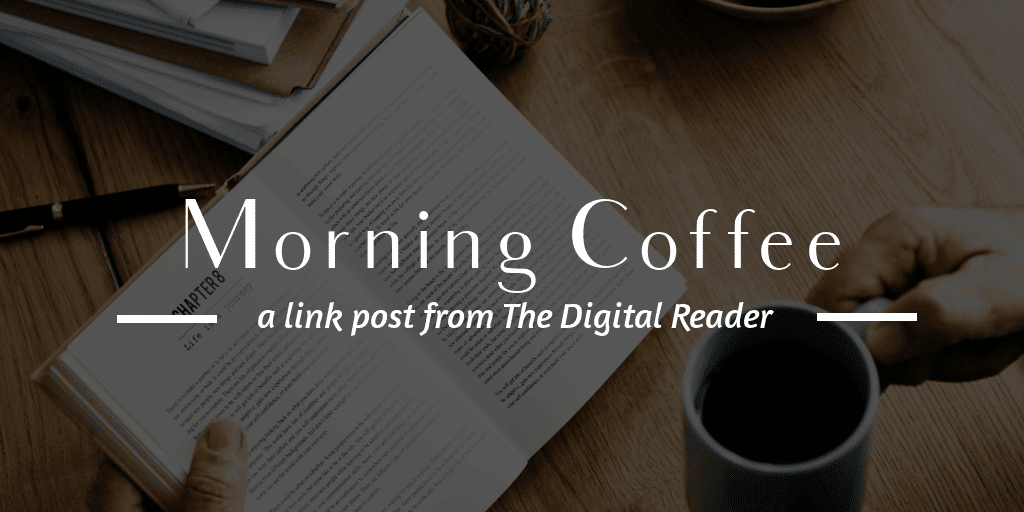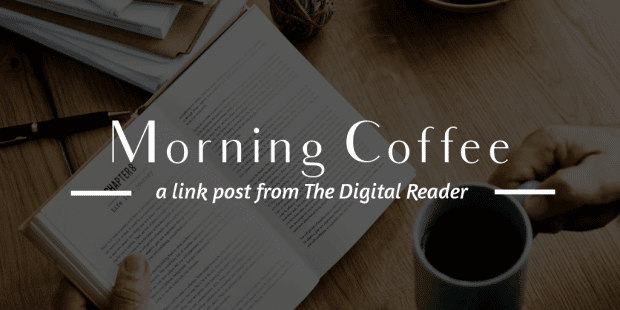Morning Coffee – 14 September 2020

Here are a few stories to read this Monday morning.
- Dictionary.com has revised 15,000+ definitions.
- Evidence suggests blue-light filters do not actually help your sleep rhythms.
- Sarah Manavis fails to prove her argument that Goodreads is bad for books.
- The lawsuit over the Internet Archive’s piracy site is going to last over a year due to a lengthy discovery period.
- Do you want to know how good the piracy case against the Internet Archive is? The IA’s supporters have to engage in wild hyperbole in its defense.
- Kris Rusch foresees a trainwreck in trad pub’s future.
- McSweeney’s explains how to host a genre-reveal party.
- Paper shortages and reduced printing capacity are causing havoc in the print book market.
- It is really strange how non-fiction publishers don’t care whether they are publishing fact or fiction.


Comments
Roland Denzel September 14, 2020 um 10:19 am
Weird. Other than the title, the Goodreads article doesn’t even mention it being bad for books. ?
The genre reveal party sounds like fun for my next book launch!
Nate Hoffelder September 14, 2020 um 11:52 am
I know, right? I mean, GR has annoying technical issues, yes, but that is a problem for GR and not anyone else.
Tom S September 14, 2020 um 1:25 pm
Re Blue filters, I think this best sums up my view: “Is it necessarily blue light alone or is the problem likely worsened by people commonly staying up late and using their devices?” (I would generalize even more to ‘staying up late’ as the primary cause, regardless of whether it involves devices)).
The most striking thing about GR is how little it has changed since Amazon bought it (and even before that). It really needs a face lift. The mobile app (which is what I use most of the time because I’m reading on a mobile device) is ugly and kind of awful, but at least it serves for basic requirements, like tracking what you have read. And as social networks go, it’s not very good. That said, time spent social networking is time away from reading, so that might be a plus.
I’m deeply skeptical that a series of questions about what I like to read can possibly train an algorithm to make good recommendations for future reading. Not every reading experience has to be ‘enjoyable’ to make it valuable and rewarding, and I like a good dose of novelty, not just regurgitation of previous reading.
Rich Loveland September 14, 2020 um 3:57 pm
Pretty frustrating read about the printing situation. I’m not in the industry, so I don’t know enough to suggest what could have been done differently, but making panicky “stop the world” decisions is looking not great in hindsight. I’m lucky that I work in a different industry and my livelihood is not tied to the decisionmakers at the publishing houses. They don’t seem to be terribly competent.
And FWIW I have family retired from paper mills, so I don’t really believe the “oh well, we give up, it’s so complex dealing with physical objects and processes”. People were handling these types of problems 50 years ago somehow with machines designed with pencil and paper. It can be done.
I smell financial engineering: M&A, “reduced” capacity, underinvestment, outsourcing
And don’t even get me started on $14 to rent access to an ebook file from Amazon
Disgusting Dude September 14, 2020 um 7:27 pm
Today’s corporate publishing has been consolidating for over 40 years and they divested and outsourced printing ages ago. They also downsized staff and converted most editors to freelance contractors.
It was all "necessary" because sales have been declining since 2003.
They really don’t have many options because Borders took a quarter of the retail shelf space when tbey were pushed into liquidation, B&N has closed stores and reduced shelf space for books in the still open locations.
And finally, the paper mills can make more money making packaging for online sales than they make on printing paper.
Forbes talked about this over a year ago:
https://www.forbes.com/sites/rachelkramerbussel/2019/06/10/how-the-paper-shortage-has-affected-book-publishing/#34ef2c9b1b26
And, of course, the pandemic has made the existing trend more acute.
Rich Loveland September 15, 2020 um 4:08 pm
Thanks for the info re: mills doing shipping boxes. I will take a look.
I hope someone can figure out a way to keep printing books profitably. Despite my snark, I am a book lover who wants to see the publishing industry succeed somehow! Even though they keep doing things that annoy me for the past 15 years or so (since I started paying attention), the fact remains that I love books and reading. All this talk of printer bankruptcies makes me worried.
Disgusting Dude September 15, 2020 um 5:10 pm
Oh, no need to worry about the pbook format.
That’s not going away for at least thirty years.
(Barring an asteroid impact or Carrington Event.)
What a train wreck is most likely to lead to is less new titles, smaller print runs, and higher prices. And that mostly for the big multinationals. New books might hit $40-50 but tbey’ll still be around. They still make Vynil discs, after all.
It might also lead to the long overdue end of the returns system. (You do know that until recently the big publishers ended up pulping about half of each new book’s print run, right?) The number has steadily declined over the last 25 years–mostly because Amazon rarely returns books, so the bigger Amazon’s share of the pbook market, the lower the losses due to overordering and returns.
Of course, that’s on the publisher side.
Tradpub Authors and independent bookstores would be creamed.
Erin September 21, 2020 um 10:20 pm
I disagree with her view that Goodreads is bad for books in general. I wouldn’t have discovered entire sub-genres, and countless authors, if not for that site. But either way, it seems more of an article to promote TheStoryGraph, which boasts offering something it found lacking in GR, and that’s next recommended reads. Goodreads does offer recommendations in various formats, and in fact many long-term users complain about recommendations and that they don’t want them at all other than finding on their own or friend’s reviews, so this may backfire. I wish other websites that are bookish success and enjoy using more than one site, but I don’t see what TheStoryGraph offers as being a worthy replacement, not even close. They are not trying to from the looks of it, so the author of the article introducing the lack of purpose with Goodreads to introduce a different focused site is iffy.